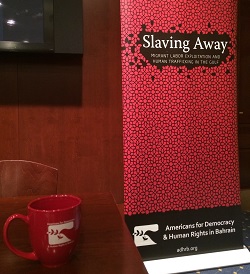8 July, 2014—Washington, D.C. —Americans for Democracy & Human Rights in Bahrain (ADHRB), in conjunction with the Solidarity Center of the AFL-CIO, hosted a briefing on Capitol Hill titled “Modern Day Slavery: What the U.S. Government and the International Community Can Do to Combat Migrant Labor Abuse and End Human Trafficking in the Gulf.” The event was cosponsored by ADHRB and the Solidarity Center of the AFL-CIO, and included participants from Human Rights Watch and Amnesty International.
الرجاء الضغط هنا لقراءة هذه الرسالة باللغة العربي
Ms. Shawna Bader-Blau, Executive Director of the Solidarity Center, served as a moderator and a panelist and introduced the panel by stating that “Worker’s rights are inseparable from human rights,” and that the solutions need to be put in the context of global governance, individual rights and global migration. Ms. Bader-Blau gave examples from Bahrain’s leading union — the GFBTU — that has been at the forefront of advocating for migrant and domestic workers’ rights in the Gulf and in the international community. The importance of civil society in Gulf countries cannot be understated, with Ms. Bader-Blau stating that “We don’t believe that any of these human trafficking problems can be solved without a broad-based civil society that has the space the monitor and advocate, and hold governments and employers accountable for this abuse.”
Sarah Leah Whitson, the Executive Director of the Middle East and North Africa Division at Human Rights Watch provided an overview of migrant worker conditions in the Gulf. Ms. Whitson pointed out that despite migrant workers comprising a majority of the population in the Middle East and in Gulf countries specifically, “they have no civil, social, legal or political rights.” This is a deliberate policy of avoiding giving residency rights to migrant workers because many of the Gulf Cooperation Council governments “know that granting such rights will soon lead to demands for representation.” She also stated that the problems facing migrant workers in the Gulf “are entirely solvable problems that are easily remedied by pretty simple and straight forward legal reforms.” Ms. Whitson described a “Triangle of oppression” in the Gulf, which is a combination of governments creating a climate in which employer abuse is possible with total impunity, the steep recruitment fees that leaves workers trapped in their host countries, and the confiscation of passports and other forms of identification from migrant workers.
James Suzano, Legal Officer at ADHRB, addressed the status of migrant workers in Bahrain and the reforms in the country aimed at amending the kafala system, which leaves migrant and trafficked workers tied to their employers and without any legal recourse. Mr. Suzano said that “even when employers abuse their migrant laborers, underpay them, or even completely withhold pay for months at a time, migrants are still unable to leave,” adding that the kafala system leaves migrants “that otherwise attempt to legitimately immigrate to Bahrain, Qatar, and Saudi Arabia …victimized by trafficking practices designed to keep them in the country, and all too often wind up in situations resembling modern-day slavery.”
James Lynch, Researcher on Migrants Rights in the Gulf at Amnesty International, focused specifically on the status of migrants and labor reforms in Qatar. Mr. Lynch stated that Qatar has faced increased and unprecedented pressure as a result its hosting of the 2022 World Cup and that the “Qatari government missed an open goal on migrant labor reform” because it’s in the spotlight. Despite this pressure, the Qatari government “didn’t do what should have been pretty straight forward…the government simply felt that it couldn’t stop the exit system,” which is a significant cause of labor exploitation in the country. The government “hasn’t felt able to pass a law which would give legal protections to workers…and it hasn’t announced that it will transparently investigate abuses against migrant workers, which should be urgently put into place.” Mr. Lynch explained the failure of the Qatari government to make reforms as a result of “vested interests that support and defend the kafala system, including business interest in the Gulf,” and that “promises to reform in the Gulf are just that,” with the media reporting promised reforms as reforms that have already been implemented. Lastly, Mr. Lynch mentioned the government’s strategic interest in withholding the amount of resources necessary to implement legal reforms or conduct oversight and that the governments of countries of origin fail to take any meaningful action on behalf of their citizens facing exploitation and abuse in Gulf countries.
All of the participants on the panel agreed that the most important thing that the U.S. Government can do is urge its allies in the Gulf to abolish the kafala system and to include discussions on human trafficking and migrants’ rights as the party of any bilateral or multilateral discussions with regard to U.S. interests in the region. Ms. Whitson and Mr. Lynch also stated that multinational corporations operating in the Gulf region have a responsibility to “use the same standards that they do in the U.S. or Belgium or Germany” in the Gulf and “they need to understand their responsibility under international standards on business and human rights to monitor and enforce labor rights.”






